Picture this: you’re sitting in your dentist’s chair, ready to take the leap toward restoring your smile with dental implants, but there’s one burning question on your mind—how long does a dental implant procedure take? You’re not alone in wondering about this. The timeline for dental implants can vary significantly from person to person, and understanding what to expect can help ease your anxiety and help you plan accordingly.
The truth is, while the actual surgical placement of a dental implant might only take 1-2 hours, the complete journey from consultation to final crown placement typically spans 3-6 months. Don’t let that timeline discourage you—every step is designed to ensure you get the strongest, most natural-looking results that will last for decades.
Key Takeaways
- Immediate procedure time: The actual implant placement surgery takes 1-2 hours per implant
- Total treatment timeline: Complete dental implant process typically takes 3-6 months from start to finish
- Healing is crucial: Most of the timeline involves osseointegration—the process where your jawbone fuses with the implant
- Multiple appointments: Expect 4-6 visits including consultation, surgery, healing checks, and crown placement
- Individual factors matter: Your healing time, bone density, and oral health significantly impact the overall timeline
Understanding the Dental Implant Process Timeline
When you’re considering dental implants in Dallas, it’s essential to understand that the process involves several distinct phases, each with its own timeframe. Let’s break down exactly how long each step takes and why timing matters for your long-term success.
Phase 1: Initial Consultation and Planning (1-2 Weeks)
Your dental implant journey begins with a comprehensive consultation that typically takes 60-90 minutes. During this appointment, your dentist will:
- Examine your oral health and medical history
- Take X-rays and possibly a CT scan
- Discuss your treatment options and expectations
- Create a personalized treatment plan
If additional procedures like bone grafting are needed, this planning phase might extend to 2-3 weeks as your dentist coordinates with specialists and orders any necessary materials.
Phase 2: Preparatory Procedures (If Needed)
Tooth Extraction: If you still have the damaged tooth, extraction typically takes 30-60 minutes. Healing time: 2-3 months.
Bone Grafting: When your jawbone isn’t thick enough to support an implant, bone grafting adds 3-6 months to your timeline. The procedure itself takes 1-2 hours.
Sinus Lift: For upper jaw implants, a sinus lift might be necessary, adding 4-6 months for complete healing.
How Long Does the Actual Dental Implant Surgery Take?
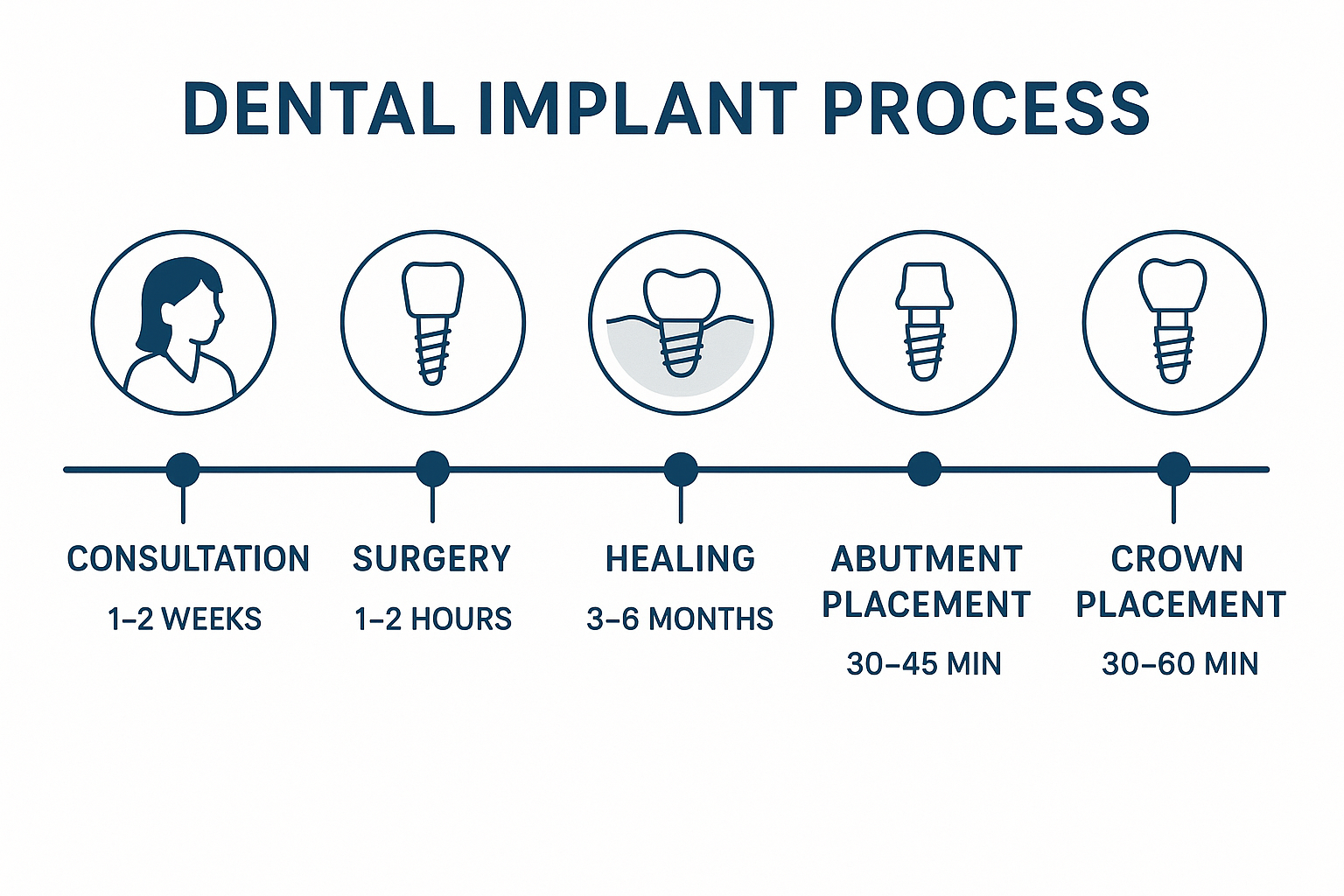
Here’s what you’ve been waiting to know: the surgical placement of a single dental implant typically takes 1-2 hours. For multiple implants, you can expect to add 30-45 minutes per additional implant.
What Happens During the Surgery?
The implant placement procedure follows these steps:
- Anesthesia administration (10-15 minutes)
- Incision and site preparation (15-20 minutes)
- Drilling the implant site (10-15 minutes)
- Implant placement (5-10 minutes)
- Suturing (10-15 minutes)
Factors That Affect Surgery Duration
Several factors can influence how long your dental implant procedure takes:
- Number of implants: Multiple implants require more time
- Bone quality: Denser bone may require more careful drilling
- Location in mouth: Front teeth are typically easier to access than back teeth
- Immediate vs. delayed placement: Immediate placement after extraction can extend surgery time
- Complexity of your case: Unique anatomical considerations may require additional time
The Healing and Osseointegration Period
After your implant is placed, the most critical phase begins: osseointegration. This process, where your jawbone grows around and fuses with the implant, typically takes 3-6 months and determines the long-term success of your implant.
Lower Jaw vs. Upper Jaw Healing Times
- Lower jaw (mandible): 3-4 months
- Upper jaw (maxilla): 4-6 months
The difference in healing time occurs because the lower jaw has denser bone, which integrates more quickly with the implant.
Signs of Proper Healing
During your healing period, you’ll have follow-up appointments every 4-6 weeks. Your dentist will look for:
✅ Absence of pain or discomfort
✅ No swelling or redness
✅ Implant stability
✅ Healthy gum tissue around the implant
Crown Placement: The Final Step
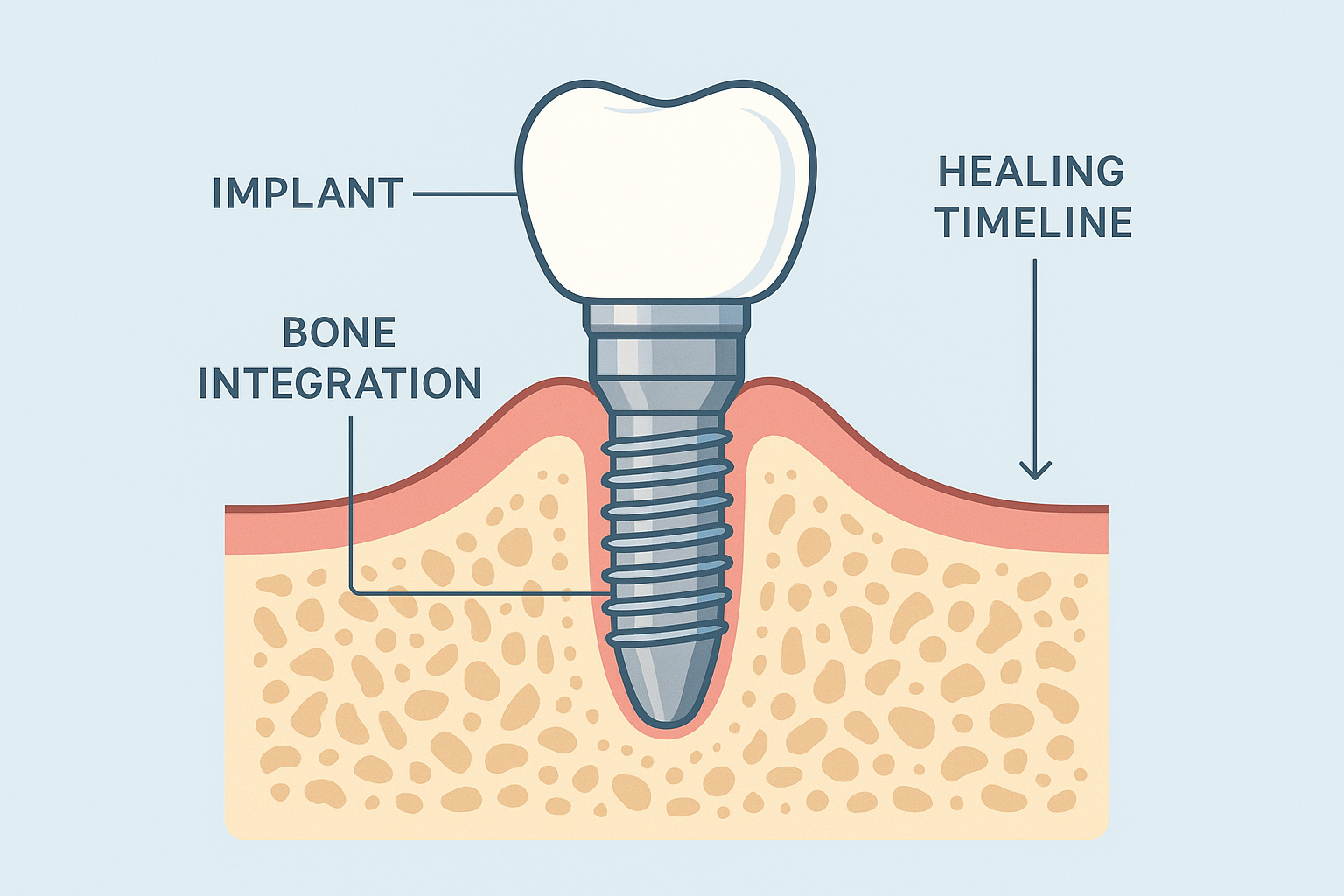
Once osseointegration is complete, it’s time for the final step: placing your custom crown. This process involves:
Abutment Placement (30-45 minutes)
The abutment—a small connector piece—is attached to your implant. Your gums need 1-2 weeks to heal around the abutment.
Crown Fabrication (1-2 weeks)
Your dentist takes impressions to create a custom crown that matches your natural teeth perfectly.
Crown Placement (30-60 minutes)
The final appointment involves placing and adjusting your new crown for optimal fit and bite.
Different Types of Dental Implants and Their Timelines
The type of implant procedure you choose significantly affects your timeline. Let’s explore the types of dental implants and their respective timeframes:
Traditional Two-Stage Implants
- Timeline: 4-6 months total
- Process: Implant placement → healing period → abutment placement → crown placement
Immediate Load Implants (Same-Day Implants)
- Timeline: Single day for implant and temporary crown
- Final crown: 3-6 months after healing
- Best for: Patients with excellent bone density and oral health
All-on-4 Dental Implants
- Timeline: 1 day for implant placement and temporary teeth
- Final prosthetic: 3-6 months after healing
- Advantage: Full arch restoration in minimal time
🦷 Dental Implant Timeline Calculator
Your Personalized Timeline
Factors That Can Affect Your Dental Implant Timeline
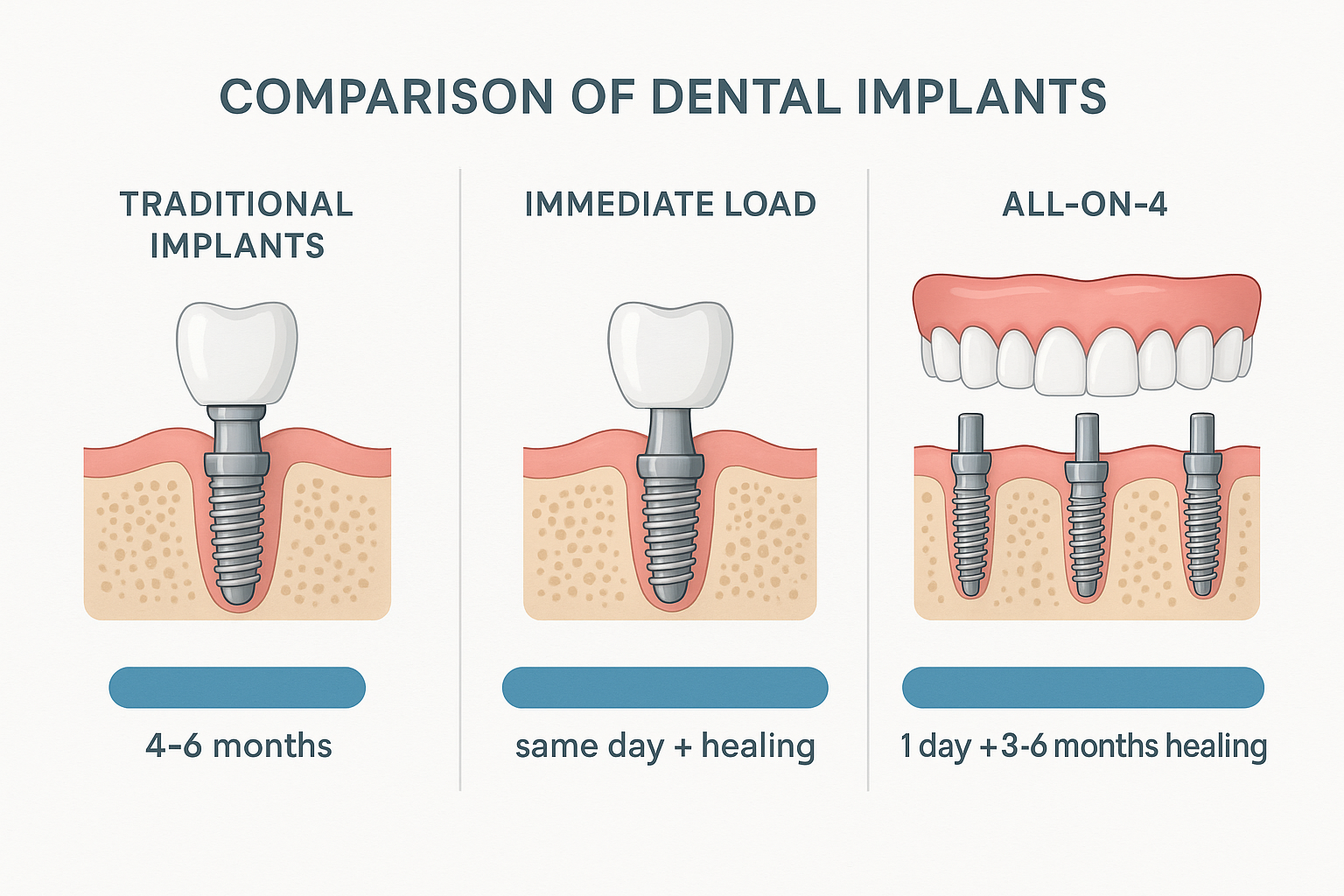
Understanding what influences your treatment timeline helps you set realistic expectations and plan accordingly. Here are the key factors that can impact how long your dental implant procedure takes:
🔍 Your Overall Health Status
Your general health plays a crucial role in healing speed:
- Diabetes: May extend healing time by 2-4 weeks
- Smoking: Can double the healing period and increase failure risk
- Autoimmune conditions: May require additional monitoring and extended timelines
- Medications: Blood thinners and certain medications can affect healing
🦴 Bone Quality and Quantity
Your jawbone condition significantly impacts both surgery duration and healing time:
- Dense, healthy bone: Faster integration (3-4 months)
- Soft or compromised bone: Longer healing period (4-6 months)
- Insufficient bone volume: Requires grafting, adding 3-6 months
📍 Implant Location
Different areas of your mouth have varying healing characteristics:
- Front teeth: Easier access, faster healing
- Back molars: More complex placement, longer procedure time
- Upper vs. lower jaw: Lower jaw typically heals 25% faster
👨⚕️ Your Dentist’s Experience
The expertise of your dental team affects:
- Surgery duration and efficiency
- Complication rates
- Overall treatment timeline
- Quality of final results
What to Expect During Recovery
Recovery is a crucial part of your dental implant timeline. Here’s what you can expect during each phase:
Immediate Post-Surgery (First 24-48 Hours)
What’s Normal:
- Mild to moderate discomfort
- Some swelling around the implant site
- Minor bleeding or oozing
- Difficulty eating hard foods
Recovery Tips:
- Take prescribed pain medications as directed
- Apply ice packs for 15-20 minutes at a time
- Stick to soft foods and room temperature liquids
- Avoid strenuous activity
First Week After Surgery
During this period, initial healing begins:
- Swelling peaks around day 3, then gradually decreases
- Sutures may be removed (if non-dissolvable)
- You can gradually return to normal activities
- Soft diet continues
Weeks 2-4: Early Healing Phase
- Gum tissue begins healing around the implant
- Discomfort should be minimal or gone
- You can resume most normal foods (avoid very hard or sticky items)
- Follow-up appointment to check healing progress
Months 2-6: Osseointegration Period
This is the most critical phase for long-term success:
- Bone cells grow around and bond with the implant surface
- No special care required—treat like a natural tooth
- Regular dental hygiene is essential
- Periodic check-ups to monitor integration
Medicare Coverage and Financial Planning for Your Timeline
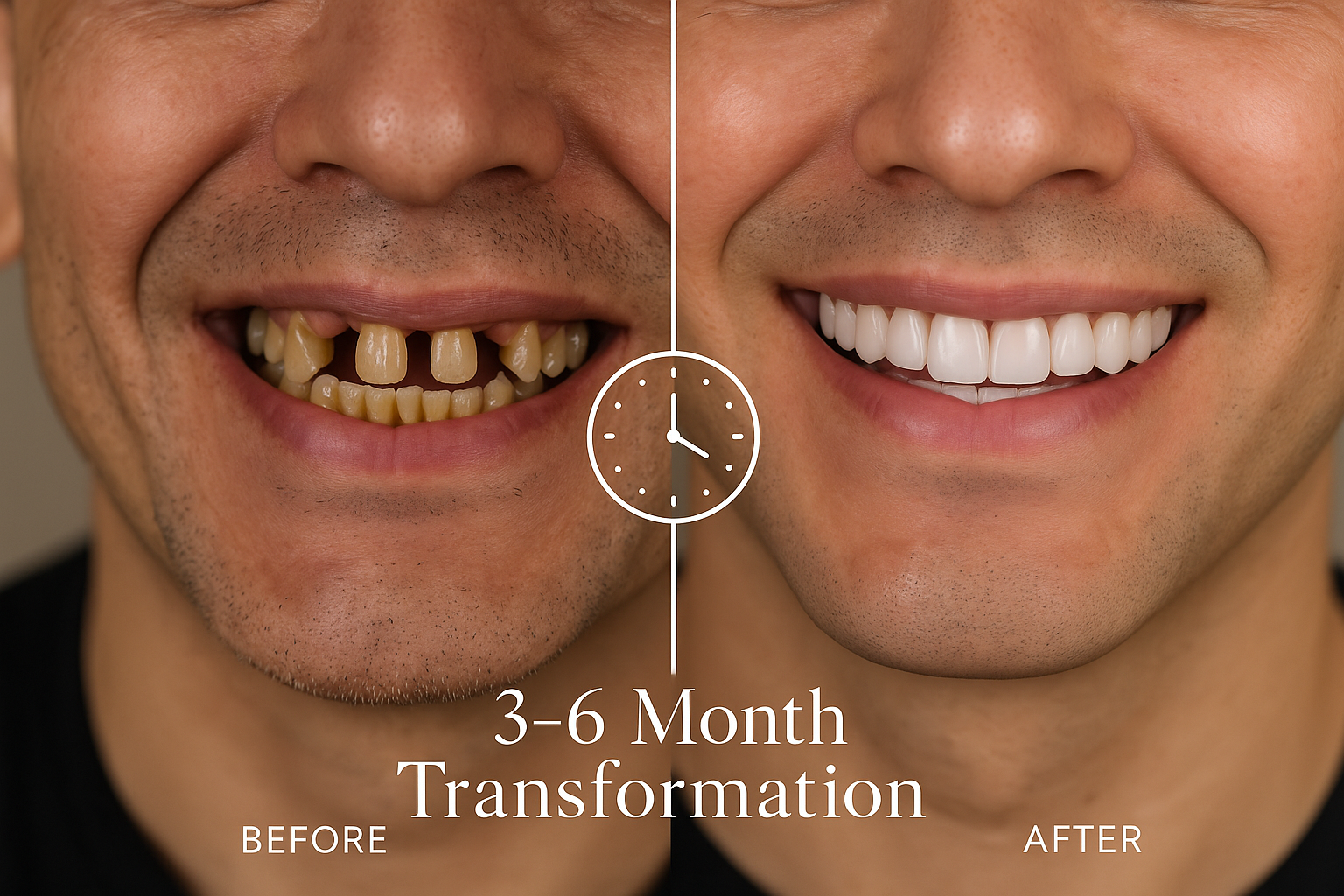
Since you’re interested in Medicare coverage for dental implants, it’s important to understand how insurance considerations might affect your treatment timeline.
Insurance Processing Time
- Pre-authorization: 2-4 weeks for approval
- Secondary insurance coordination: Additional 1-2 weeks
- Appeals process: Can add 4-8 weeks if initial claims are denied
Alternative Coverage Options
While traditional Medicare typically doesn’t cover dental implants, you might explore:
- Medicare Advantage plans: Some include dental benefits
- Supplemental dental insurance: May cover portions of treatment
- Medical necessity cases: When implants are required due to accident or medical condition
Understanding your coverage options early in the process prevents delays and helps you budget appropriately for your treatment timeline.
Tips to Optimize Your Dental Implant Timeline
Want to ensure your dental implant process goes as smoothly and quickly as possible? Here are expert tips to optimize your timeline:
Before Surgery
✅ Maintain excellent oral hygiene to ensure optimal healing conditions
✅ Quit smoking at least 2 weeks before surgery (ideally longer)
✅ Follow pre-operative instructions exactly as provided
✅ Arrange time off work for surgery and initial recovery
✅ Stock up on soft foods and pain management supplies
During Healing
✅ Follow all post-operative care instructions
✅ Attend all follow-up appointments as scheduled
✅ Maintain gentle oral hygiene around the implant site
✅ Eat a nutritious diet to support healing
✅ Avoid alcohol and tobacco which can impair healing
Long-term Success
✅ Practice excellent oral hygiene to ensure implant longevity
✅ Use a soft-bristled toothbrush and non-abrasive toothpaste
✅ Schedule regular dental cleanings every 3-6 months
✅ Protect your investment with a nightguard if you grind your teeth
When Complications Might Extend Your Timeline
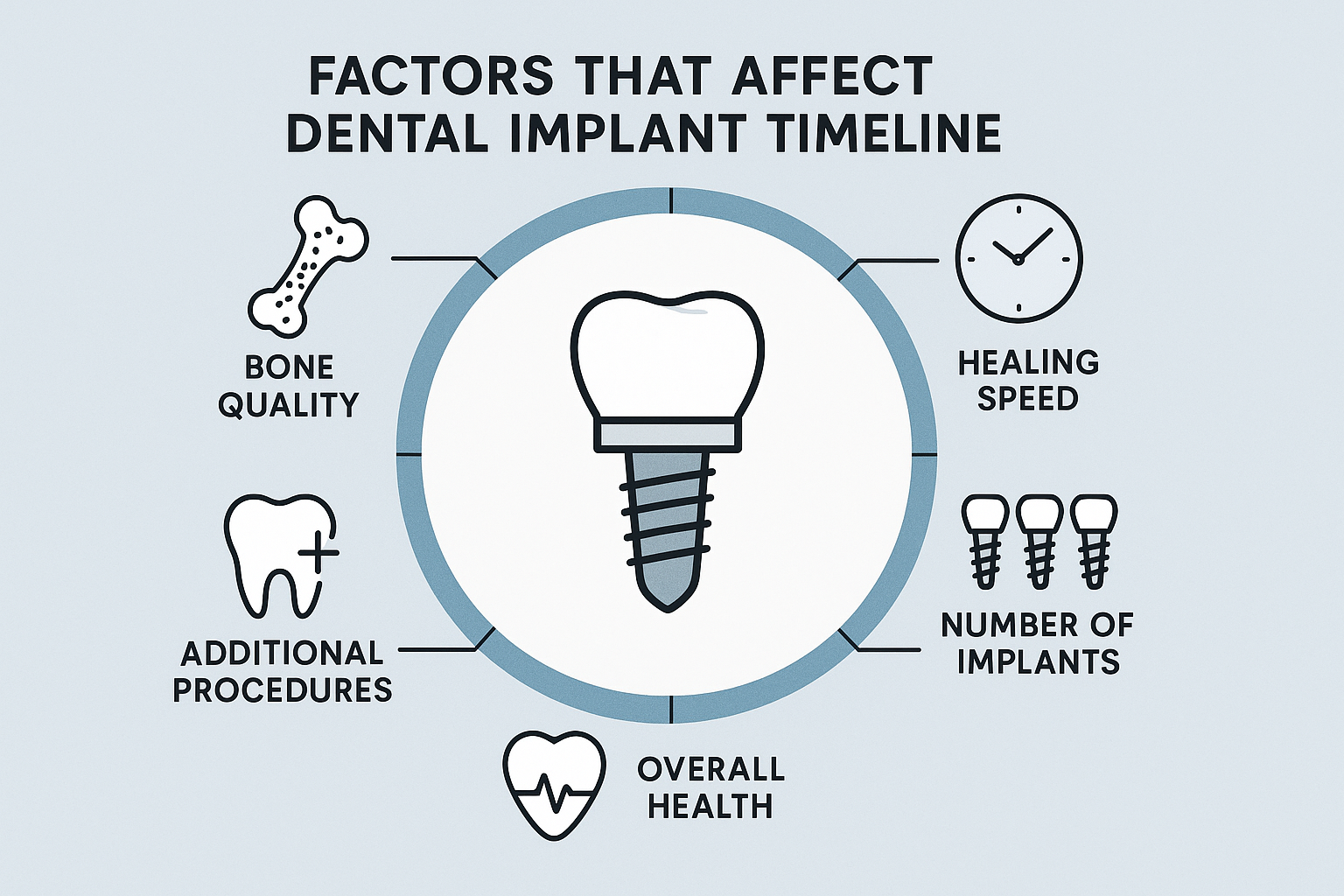
While dental implants have a 95-98% success rate, certain complications can extend your treatment timeline:
Early Complications (First Few Weeks)
- Infection: May require antibiotic treatment and extended healing
- Implant mobility: Could necessitate implant removal and replacement
- Excessive bleeding: Might delay the next phase of treatment
Late Complications (During Osseointegration)
- Failed integration: Requires implant removal, healing period, and replacement
- Nerve damage: May need additional treatment and monitoring
- Sinus complications: Could require additional procedures
How to Minimize Complication Risk
The best way to stay on schedule is preventing complications:
- Choose an experienced implant dentist
- Follow all pre and post-operative instructions
- Maintain excellent oral hygiene
- Don’t smoke or use tobacco products
- Attend all scheduled follow-up appointments
Comparing Dental Implant Timelines to Other Tooth Replacement Options
Understanding how dental implant timelines compare to other options helps you make an informed decision:
| Treatment Option | Initial Procedure Time | Total Timeline | Longevity |
|---|---|---|---|
| Dental Implants | 1-2 hours | 3-6 months | 25+ years |
| Dental Bridge | 2-3 hours | 2-3 weeks | 10-15 years |
| Partial Denture | 1-2 hours | 2-4 weeks | 5-7 years |
| Complete Denture | 2-3 hours | 4-8 weeks | 5-10 years |
While dental implants require the longest initial timeline, they offer superior longevity and functionality, making them the most cost-effective long-term solution.
Real Patient Timeline Examples
To help you better understand how long a dental implant procedure takes in real-world scenarios, here are some typical patient timelines:
Sarah’s Single Front Tooth Replacement
- Week 1: Consultation and treatment planning
- Week 3: Implant placement surgery (1.5 hours)
- Week 17: Abutment placement (45 minutes)
- Week 19: Final crown placement (1 hour)
- Total timeline: 19 weeks (4.5 months)
Michael’s All-on-4 Full Arch Restoration
- Week 1-2: Consultation, planning, and extractions
- Week 4: All-on-4 implant placement with temporary teeth (4 hours)
- Week 20: Final prosthetic placement (2 hours)
- Total timeline: 20 weeks (5 months)
Linda’s Multiple Implant Case with Bone Grafting
- Week 1-2: Consultation and planning
- Week 4: Bone grafting procedure (2 hours)
- Week 20: Implant placement (2.5 hours for 3 implants)
- Week 36: Abutment and crown placement (2 hours)
- Total timeline: 36 weeks (9 months)
These examples show how individual factors significantly impact your personal timeline.
Frequently Asked Questions About Dental Implant Timelines
Can the process be faster than 3-6 months?
Yes, with immediate load implants and optimal conditions, you can have a functional tooth the same day. However, complete healing still takes 3-6 months.
What happens if I need multiple implants?
Each additional implant adds approximately 30-45 minutes to surgery time, but the overall timeline remains similar since healing occurs simultaneously.
Can I work the day after implant surgery?
Most patients can return to desk work within 1-2 days, but avoid strenuous physical activity for at least a week.
How often will I need follow-up appointments?
Typically, you’ll have appointments at 1 week, 1 month, 3 months, and 6 months post-surgery, then annually for maintenance.
Conclusion: Your Journey to a Confident Smile
Understanding how long a dental implant procedure takes empowers you to make informed decisions about your oral health. While the complete process typically spans 3-6 months, remember that this timeline includes crucial healing phases that ensure your implant will last for decades.
The actual surgery—just 1-2 hours of your time—is a small investment for a lifetime of confident smiling, comfortable eating, and improved oral health. Every step of the timeline serves a purpose: ensuring proper integration, optimal healing, and long-term success.
Ready to start your journey to a restored smile? The first step is scheduling a consultation with an experienced implant dentist who can provide a personalized timeline based on your unique situation. Don’t let concerns about timing prevent you from reclaiming your confidence—the sooner you begin, the sooner you’ll be enjoying your new smile.
Your future self will thank you for taking this important step toward better oral health and renewed confidence. Contact our Dallas dental implant specialists today to schedule your consultation and get your personalized treatment timeline.

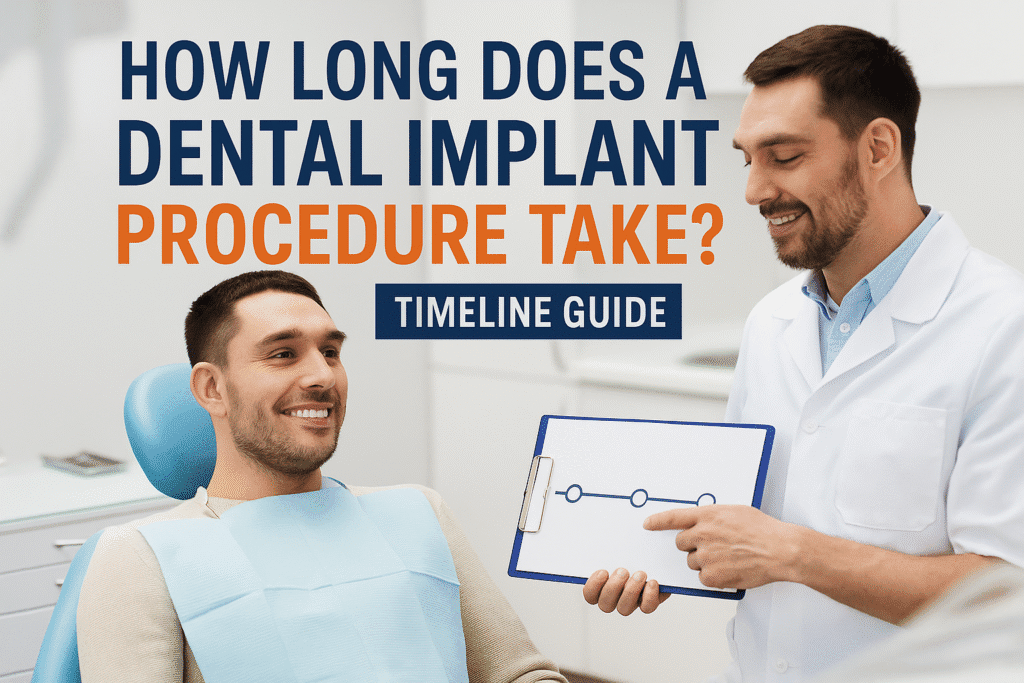
Leave a Reply
Share your thoughts or ask a question about dental implants. Your email address will not be published.